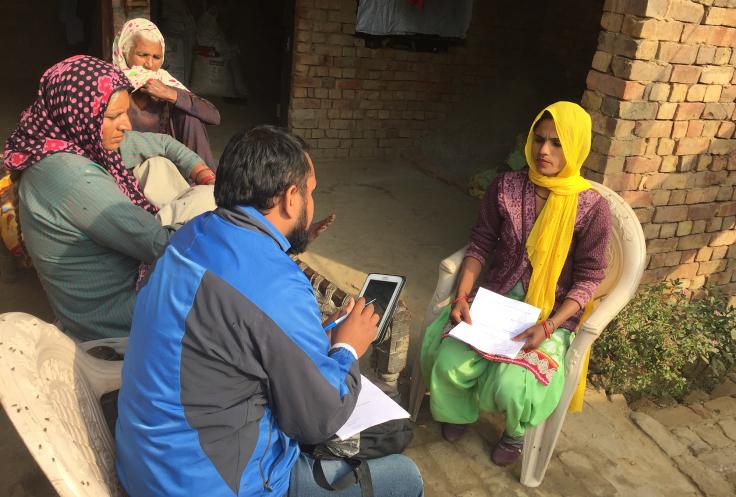July 2020 Newsletter

J-PAL launches regional center in Middle East and North Africa
This week, J-PAL announced the launch of its newest regional research center. With support from Community Jameel, J-PAL Middle East and North Africa (MENA) will be based at the American University in Cairo and will work with policymakers to co-design, evaluate, and scale effective policies and programs to improve the lives of the region’s most vulnerable. Read more »
Supporting government responses to the COVID-19 crisis
Evidence-informed policymaking is especially critical in times of global crisis. Understanding how to apply existing evidence to the current context, however, requires a close reading of the research and a deep understanding of local conditions. As the coronavirus pandemic took hold worldwide, J-PAL affiliated professors and staff jumped into action, supporting the generation of evidence and research innovations that enable governments to develop effective responses. Read more »
Addressing recent increases in gender-based violence
Many countries have witnessed a surge in cases of domestic violence due to the onset of the coronavirus pandemic and subsequent stay-at-home orders. J-PAL staff reviewed existing evidence on interventions that governments could consider adopting to protect women living in abusive households. Read more »
COVID-19 update: Learn more about J-PAL’s response »
SPECIAL SECTION: MARKING A MILESTONE

1,000 randomized evaluations conducted by J-PAL affiliated researchers
In February, we reached an important milestone: researchers in the J-PAL network collectively conducted over 1,000 randomized evaluations across 84 countries. From the early days of deworming and Balsakhi remedial tutoring to the frontier of climate change and social protection, J-PAL affiliated researchers, staff, and partners have helped to define the agenda for poverty alleviation research.
Given the substantial changes that have occurred around the world in recent months, we postponed this recognition and focused on supporting our staff, affiliate network, and partners. Six months later, we revisit this milestone with a new perspective. In the face of COVID-19, our expanding library of evaluations and the expertise of J-PAL affiliated researchers have enabled us to inform the design of policies that support the world’s most vulnerable. Read more »
Most-read evaluations across J‑PAL’s ten sectors
To celebrate this achievement, we looked back at the three most-read evaluations conducted by J-PAL affiliated professors from each sector on topics ranging from understanding hiring discrimination to training smallholder farmers. Read more »
Staff voices
Read a sample of the blogs written by J-PAL staff in celebration of the work conducted by our network of affiliates, staff, and research teams.
Data collection at J-PAL Africa: Spotlight on field officers
Claudia Dhludhlu (Office Manager, J-PAL Africa)
Measuring social attitudes and norms in impact evaluations: Examples from India
Moulshri Mohan (Senior Policy and Training Associate, J-PAL South Asia), Anna Rego (Policy Manager, J-PAL South Asia)
Foundations of ethical and high-quality data collection during the COVID-19 pandemic
Shobhini Mukerji (Executive Director, J-PAL South Asia), Vidita Priyadarshini (Policy and Communications Associate, J-PAL South Asia)
Catalyzing research partnerships: Matchmaking from A to Z
Anna Schrimpf (Executive Director, J-PAL Europe), Ana Maria Tabacaru (Senior Policy Associate, J-PAL Europe)
Voices from the field: Enumerator spotlight
Keesler Welch (Senior Research Associate, Trial Registry, J-PAL)
Video: Behind the scenes with J‑PAL research staff
Every evaluation conducted by a J-PAL affiliated researcher is supported by teams of hardworking enumerators, field team managers, and research assistants. This video highlights their experience working on evaluations across the world. Watch the video »
MEDIA HIGHLIGHTS
Learning from the lockdown (Opinion)
Project Syndicate
J-PAL webinar series on program evaluation draws global audience
MIT News
Covid-19: Adopting a new method of teaching (Opinion)
Hindustan Times
Hard data for hard choices (Opinion)
Project Syndicate
5 economists redefining everything. Oh yes, and they’re women
Forbes
NEW RESEARCH PAPERS
Messages on COVID-19 Prevention in India Increased Symptoms Reporting and Adherence to Preventive Behaviors Among 25 Million Recipients with Similar Effects on Non-recipient Members of Their Communities
Abhijit Banerjee, Marcella Alsan, Emily Breza, Arun G. Chandrasekhar, Abhijit Chowdhury, Esther Duflo, Paul Goldsmith-Pinkham, Benjamin A. Olken
Effects of a Workplace Wellness Program on Employee Health, Health Beliefs, and Medical Use: A Randomized Clinical Trial
Julian Reif, David Chan, Damon Jones, Laura Payne, David Molitor
Do Information Technologies Improve Teenagers’ Sexual Education? Evidence from a Randomized Evaluation in Colombia
Alberto Chong, Marco Gonzalez-Navarro, Dean Karlan, Martín Valdivia
Changing Gambling Behavior through Experiential Learning
Martin Abel, Shawn Cole, Bilal Zia
Upcoming Events and Trainings
Enroll now in J-PAL 101x: Evaluating Social Programs
Enroll in J-PAL’s online Evaluating Social Programs course before August 14. This is a free, self-paced course to learn how to use randomized evaluations to rigorously measure the impact of social programs. Through lectures from MIT faculty and J‑PAL affiliated professors, along with case studies from real randomized evaluations, participants will cover topics ranging from how to effectively measure outcomes and choose an appropriate sample size, to common threats to analysis. Learn more »